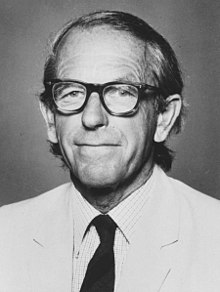Frederick Sanger
| Frederick Sanger | |
|---|---|
 |
|
| Born |
13 August 1918 Rendcomb, Gloucestershire, England |
| Died | 19 November 2013 (aged 95) Cambridge, Cambridgeshire, England |
| Nationality | British |
| Fields | Biochemistry |
| Institutions | |
| Alma mater | St John's College, Cambridge |
| Thesis | The metabolism of the amino acid lysine in the animal body (1943) |
| Doctoral advisor | Albert Neuberger |
| Doctoral students | |
| Known for |
Amino acid sequence of insulin Sanger sequencing Sanger Centre |
| Notable awards |
|
Frederick Sanger OM CH CBE FAA (/ˈsæŋər/; 13 August 1918 – 19 November 2013) was a British biochemist who won the Nobel Prize in Chemistry twice, one of only two people to have done so in the same category (the other is John Bardeen in physics), the fourth person overall with two Nobel Prizes, and the third person overall with two Nobel Prizes in the sciences. In 1958, he was awarded a Nobel Prize in chemistry "for his work on the structure of proteins, especially that of insulin". In 1980, Walter Gilbert and Sanger shared half of the chemistry prize "for their contributions concerning the determination of base sequences in nucleic acids". The other half was awarded to Paul Berg "for his fundamental studies of the biochemistry of nucleic acids, with particular regard to recombinant DNA".
Frederick Sanger was born on 13 August 1918 in Rendcomb, a small village in Gloucestershire, England, the second son of Frederick Sanger, a general practitioner, and his wife, Cicely Sanger (née Crewdson). He was one of three children. His brother, Theodore, was only a year older, while his sister May (Mary) was five years younger. His father had worked as an Anglican medical missionary in China but returned to England because of ill health. He was 40 in 1916 when he married Cicely who was four years younger. Sanger's father converted to Quakerism soon after his two sons were born and brought up the children as Quakers. Sanger's mother was the daughter of a wealthy cotton manufacturer and had a Quaker background, but Cicely was not a Quaker.
...
Wikipedia
